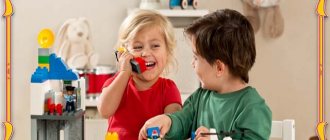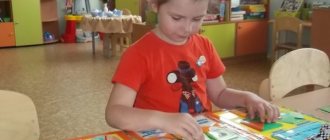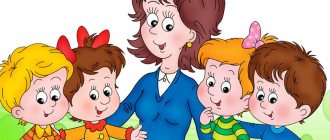Organization of play activities for preschoolers in the context of the introduction of the Federal State Educational Standard for Education. - presentation
Organization of play activities for preschool children in the context of the introduction of the Federal State Educational Standard for Education
The role of play in the development of a child. The purposeful nature of the game; Fostering determination in children; Developing a desire to bring the work started to its logical conclusion; Formation of responsibility for one’s actions; Development of the ability to put plans into practice; Developing the ability to negotiate with playing partners; Formation of the ability to evaluate and respect the opinions of others; Raising other positive qualities in children.
Organization of play activities in preschool educational institutions Draft standard of preschool education and the place of play activities in it Classification of children's games Variability of games Guidance of children's play activities
Scheme of preparation for games in different age groups Preparation of attributes; Learning the game; Organization of the game under the guidance of a teacher; Organization of independent play; Development of self-organization skills.
Developing object-based play environment The basis for independent playful creative activity of children; Constant enrichment with game attributes; Requirements for toys; On modern criteria for evaluating children's games and toys in San PiN
Type of games Didactic Game exercise Director's Board-print Folk Musical-didactic Construction Game-dramatization Movable Game-pantomime Verbal Plot-role-playing Sports Game-fun Attraction Game on the carpet Theatrical Intellectual Finger
Daily cycle of games Verbal; Sports; Fun game; Didactic; Director's; Movable; Palchikova and others. Planning games in the calendar plan (5 moments of gaming activity in the daily routine).
Days of the week Morning Walk 1st half. of the day Evening Walk 2nd half. days 1st week 2nd week 3rd week 4th week 1. Long-term planning for organizing a role-playing game. Monday. Didactic game for children's speech development (dictionary). Didactic game for the development of cognitive mental processes. Independent creative games for children (creation of an object-based play environment that stimulates play intentions). Didactic game with natural history content (familiarization with nature). Didactic game on the topic of getting to know your surroundings. Independent outdoor games for children. Reading works. Conversation. Story Observation. Consideration of trivania. Targeted walk Production of attributes, gaming equipment, panels, objects Didactic game to enrich gaming experience, teaching action, dialogue. Game exercises with elements of sports games (hockey, football). Didactic game 1st half of the day. Independent creative games. 2. Independent role-playing games. Tuesday Didactic game PP. Didactic game PPP. Independent theatrical games initiated by children. Didactic game OP. Independent theatrical games initiated by children. Outdoor games 1. Long-term planning for organizing theatrical games. Game exercises with elements of sports games (volleyball). Didactic game 1st half of the day. Independent creatives. games. Outdoor games. Reading, conversation. Work on the expressiveness of speech and gestures. Production of attributes, costumes. Theater show 2. Independent theatrical games initiated by children
Days of the week Morning Walk 1st half. of the day Evening Walk 2nd half. days 1st week 2nd week 3rd week 4th week 1. Construction and constructive games Environment Didactic game PP. Didactic game PPP. Independent construction games initiated by children. I am a didactic game OP. Didactic game OO. Independent construction games initiated by children. Outdoor games. Examination of illustrations and photographs. Games based on a model, diagram, drawing. Joint construction, training in design. Playing around the building Game exercises with elements of sports games (badminton). Didactic game 1st half of the day. Independent creatives. games. Outdoor games. 2. Independent construction games initiated by children. Chet. Didactic game for the development of mathematical concepts. Didactic game PPP. Independent creative games Didactic game OP. Didactic game OO. Independent creative games. 1. Entertainment according to plan. 2. Independent creative games (with continuation, without the participation of a teacher) Game exercises with elements of sports games (basketball). Didactic game 1st half of the day. Independent creatives. games. Outdoor games.
Days of the week Morning Walk 1st half. of the day Evening Walk 2nd half. days 1st week 2nd week 3rd week 4th week 1. Collective work Friday Didactic game for the development of children's speech (vocabulary). Didactic game PPP. Independent creative games. Didactic game OP. Didactic game OO. Independent creative games. Outdoor games Self-care Domestic and household activities Manual In nature Game exercises with elements of sports games (small towns). Didactic game 1st half of the day. Independent creatives. games. Outdoor games
Names of role-playing games Kindergarten Travelers Veterinary service Supermarket Shopping and entertainment center Pet store Shoe store Office of good offices Theater Television Farming Family Architects Waste processing plant Artists Library Confectionery factory Writers Crossroads Clothing store Museum Cosmonauts Shop Gardener School Motor ship Pharmacy of medicinal herbs Cafe Water park Hair salon
Role-playing games in development Stage I – 2 – 3 lessons Stage II – 2-3 lessons Stage III – lessons Stage IV – 1 lesson
Stage I Introduction to the profession; Familiarity with external attributes (room for work, special clothing); Features of the interiors; Occupation
Stage II 1. Selection of aids for the game: - Selection from the presented range of items necessary for the game; — Production of decorations; — Production of advertising booklets; — Making tools for activities 2. Clarification of the name and purpose of tools for work 3. Acquaintance with the method of action, with tools
Stage III Introducing children to role-playing actions; Clarification of the specifics of the dialogue; Exercise children in dialogue; Voiceover and virtual demonstration of the game progress
Stage IV Determining the location of the playing space; Installation of decorations; Decomposition of attributes; Distribution of roles; Putting on game costumes; The beginning of the game action (in the main role is the teacher); Indirect observation of the development of the game's plot; Delicate implementation into the course of the game if necessary
Presentation on the topic “Game activities in kindergarten”presentation on the topic
Slide 1
MUNICIPAL PRE-SCHOOL EDUCATIONAL INSTITUTION KINDERGARTEN No. 6 Malyshok, Ershov, Saratov Region Educator Makarova I. A “We play together. Assorted games for social and communicative development"
Slide 2
Anton Semyonovich Makarenko as an outstanding Soviet teacher “Play is important in the life of a child, it has the same meaning as activity, work, service for an adult. What a child is like at play, so in many ways he will be at work when he grows up. Therefore, the education of a future leader occurs, first of all, in play. And the whole history of an individual person as an activist and worker can be represented in the development of play and in its gradual transition into work.”
Slide 3
“For preschool children, games are of exceptional importance: play for them is study, play for them is work, play for them is a serious form of education. Play for preschoolers is a way of understanding the environment” N.K. Krupskaya From a child’s point of view, play is getting maximum pleasure from life. From the point of view of a specialist, play is a leading activity in childhood that gives the child the opportunity to develop. From a parent's point of view, play is anxiety, trouble and chaos in the room.
Slide 4
Social and communicative development of preschool children One of the main aspects of readiness for systematic learning is social and communicative skills. Sociability and the ability to communicate with other people are a necessary component of a person’s self-realization and success in various types of activities. The social and communicative development of preschool children occurs through play as a leading children's activity. Communication is an important element of any game. During play, the child’s social, emotional and mental development occurs. Play gives children the opportunity to recreate the adult world and participate in an imaginary social life. Children learn to resolve conflicts, express emotions and interact appropriately with others.
Slide 5
Speech is one of the important lines of child development. Thanks to their native language, children enter our world and receive ample opportunities to communicate with other people. One of the most important sections of verbal communication is vocabulary enrichment. Logical, rich speech is the key to success in many areas of knowledge.
Slide 6
While playing, children can express themselves in different ways. They interact either in pairs (with a leader or a partner), then in threes or fours, or with the whole group. Games create a special space in which children gain new experiences, develop social, emotional, physical, and intellectual abilities, and prepare for new life demands, including school ones.
Slide 7
Classification of games Creative games And games with rules Folk
Slide 8
Creative games Theatrical Theatre-role-playing Design Directing Dramatization games With elements of artistic and creative activity With elements of labor
Slide 9
Everyone has a “Childhood Shore” in their life, where there is a sea of fairy tales and magical dreams. You can’t look at this beauty enough... I really want to come back again and again... The blue sea awaits us. In places! Full speed ahead! I see the island of fairy tales. Who lives there, friends? Objectives: to develop artistic taste, creative abilities, to form a sustainable interest in theatrical art. By participating in theatrical games, children learn about the world around them and become participants in events from the lives of people, animals and plants. The themes of theatrical games can be varied. Theatrical games
Slide 10
- a type of unproductive activity, the motive of which lies not in its results, but in the process itself. All aspects of the personality are involved in the game: the child moves, speaks, perceives, thinks; During the game, all his mental processes are actively working: thinking, imagination, memory, emotional and volitional manifestations are intensified. Each such game is characterized by: theme, game concept, plot, content and role. Role-playing game “Beauty salon” “At the doctor’s appointment”
Slide 11
Games with rules Didactic Outdoor games for orientation in space with running and jumping with climbing with throwing and catching and games with objects verbal and board-printed
Slide 12
“Call it in one word”
Slide 13
“Find the extra one” “Call me kindly”
Slide 14
Outdoor games Play can be a means of self-knowledge, entertainment, recreation, and a means of physical and general education. The importance of outdoor games is great: they are both a means and a method of raising a child. Outdoor play is characterized by a variety of effects on the child due to physical exercises included in the game in the form of motor tasks. Based on the general goals of physical education of preschoolers, we will highlight the main tasks that are solved when conducting outdoor games. These include: health, educational and educational.
Slide 15
collective individual plot seasonal ritual games-attractions games-fun games - traps theatrical household Folk games
Slide 16
All ancient holidays, rituals and actions, games - be it a round dance, walking on coals or just children's fun, where children measure their strength and dexterity - always have a dual character. On the one hand, this is a kind of theatrical performance that is interesting both for the participants themselves and for the audience, and on the other hand, almost every element of such a performance carries within itself a certain sacred and educational principle. Folk outdoor games promote the development of intelligence, concentration, coordination of movements and visual perception, as well as the development of imagination, expressiveness of speech, and communication skills. Folk games
Slide 17
Thus, the phenomenon of play should be treated as a unique phenomenon of childhood. It is important to develop in preschoolers the ability to build relationships with others on the basis of cooperation and mutual understanding, to ensure general mental development, to form the prerequisites for educational activities and qualities necessary for adaptation to school and successful learning in primary school. Adults open up the future for children, act as mediators and accomplices in relation to children’s activities in order to help children gain their own experience.
Slide 18
Creative success to you!!!
PRESENTATION: DEVELOPMENT OF PLAY ACTIVITIES OF PRESCHOOL CHILDRENpresentation for a lesson on the topic
Slide 1
CONTENT OF WORK WITH PRESCHOOL CHILDREN IN THE EDUCATIONAL FIELD “SOCIALIZATION” (DEVELOPMENT OF PLAY ACTIVITIES OF PRESCHOOL CHILDREN) Prepared by: teacher of MBDOU No. 41 “Cheburashka” Stolyarova V.V.
Slide 2
GOAL - mastering initial ideas of a social nature and including children in the system of social relations. TASKS: - development of children's play activity - familiarization with elementary generally accepted norms and rules of relationships with peers and adults (including moral ones); - formation of gender, family, citizenship, patriotic feelings, a sense of belonging to the world community.
Slide 3
development of children's play activities: Role-playing games Outdoor games Theatrical games Didactic games
Slide 4
3-5 years Role-playing games - Encourage children to participate in joint games. -Develop the ability to choose a role, perform several interrelated actions when playing with toys - Develop the ability to interact and get along with each other in a short game together. — To develop in children the ability to agree on what they will build. — To develop in children the ability to follow the rules of behavior during the game.
Slide 5
3-5 years old Outdoor games - To develop children’s activity in motor activities. — Organize games with all children. -Gradually introduce games with more complex rules and changing types of movements. — Develop children’s creative abilities in games (inventing game options, combining movements).
Slide 6
3-5 years Theatrical games - Arouse children's interest in theatrical games. — Develop the ability to imitate the characteristic actions of characters, convey the emotional state of a person. — Introduce children to the techniques of driving tabletop dolls. — Encourage children to show initiative and independence in choosing a role, plot, and means of transformation.
Slide 7
3-5 years Didactic games - Strengthen the ability to select objects by color and size. — Learn to assemble a picture from 4-6 parts (“Our dishes”, “Toys”, etc.). - Introduce didactic games aimed at consolidating ideas about the properties of objects, composing a whole from parts (cubes, mosaics). — Encourage children’s desire to master the rules of the simplest board and printed games (“Dominoes”, “Loto”).
Slide 8
5-7 years Role-playing games - Continue to develop the ability to coordinate your actions with the actions of your partners - Form the habit of carefully putting toys away in the designated place. — Cultivate goodwill, a willingness to help out a peer: the ability to take into account the interests and opinions of fellow players, to resolve disputes fairly.
Slide 9
5-7 years old Outdoor games - Continue to teach children to independently organize familiar outdoor games. — To introduce and develop interest in folk games. — To develop the ability to show honesty and fairness in independent games with peers. — Strengthen the ability to fairly evaluate the results of the game.
Slide 10
5-7 years Theatrical games - Create an atmosphere of creativity and trust. — Encourage improvisation, develop the ability to feel free in a role. — To cultivate artistic qualities, to reveal the creative potential of children — To develop creative independence, aesthetic taste in conveying an image; clarity of pronunciation. — Cultivate a love for the theater.
Slide 11
5-7 years Didactic games - To form a desire to act with a variety of didactic games and toys (folk, electronic, computer games, etc.). — Strengthen the ability to follow the rules of the game. — Strengthen children’s ability to play various educational games (lotto, mosaic, etc.). — Develop intelligence and the ability to independently solve a given problem.
Slide 12
RESULTS: - Independently selects or invents various plots for games. — Sticks to the intended plan while playing, leaving room for improvisation. - In didactic games, negotiates with peers about the order of moves, the choice of cards, schemes; proves himself to be a tolerant and friendly partner. — In a conversation about the performance he watched, he can express his point of view. — Possesses the skills of theatrical culture: knows theatrical professions, rules of behavior in the theater.
Slide 13
THANK YOU FOR YOUR ATTENTION!!!



